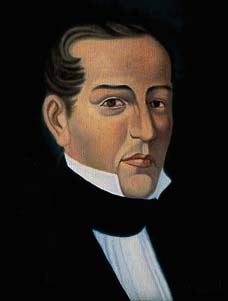
José María Heredia y Heredia
Encyclopedia

Cuba
The Republic of Cuba is an island nation in the Caribbean. The nation of Cuba consists of the main island of Cuba, the Isla de la Juventud, and several archipelagos. Havana is the largest city in Cuba and the country's capital. Santiago de Cuba is the second largest city...
n poet
Poet
A poet is a person who writes poetry. A poet's work can be literal, meaning that his work is derived from a specific event, or metaphorical, meaning that his work can take on many meanings and forms. Poets have existed since antiquity, in nearly all languages, and have produced works that vary...
, born at Santiago de Cuba
Santiago de Cuba
Santiago de Cuba is the second largest city of Cuba and capital city of Santiago de Cuba Province in the south-eastern area of the island, some south-east of the Cuban capital of Havana....
.
He studied at the University of Havana
University of Havana
The University of Havana or UH is a university located in the Vedado district of Havana, Cuba. Founded in 1728, the University of Havana is the oldest university in Cuba, and one of the first to be founded in the Americas...
, and was called to the bar in 1823. In the autumn of 1823 he was arrested on a charge of conspiracy against the Spanish
Spain
Spain , officially the Kingdom of Spain languages]] under the European Charter for Regional or Minority Languages. In each of these, Spain's official name is as follows:;;;;;;), is a country and member state of the European Union located in southwestern Europe on the Iberian Peninsula...
government, and was sentenced to banishment for life. He took refuge in 1825, and then went to Mexico
Mexico
The United Mexican States , commonly known as Mexico , is a federal constitutional republic in North America. It is bordered on the north by the United States; on the south and west by the Pacific Ocean; on the southeast by Guatemala, Belize, and the Caribbean Sea; and on the east by the Gulf of...
, where, becoming naturalized, he obtained a post as magistrate.
In 1832 a collection of his poems was issued at Toluca
Toluca
Toluca, formally known as Toluca de Lerdo, is the state capital of Mexico State as well as the seat of the Municipality of Toluca. It is the center of a rapidly growing urban area, now the fifth largest in Mexico. It is located west-southwest of Mexico City and only about 40 minutes by car to the...
, and in 1836 he obtained permission to visit Cuba for two months. Disappointed in his political ambitions, and broken in health, Heredia returned to Mexico in January 1837, and died at Toluca on the 21 May 1839.
Many of his earlier pieces are merely clever translations from French, English and Italian; but his originality is placed beyond doubt by such poems as the Himno del desterrado, the epistle to Emilia, Desengaños, and the celebrated ode to Niagara. One of his most celebrated poems was called "En El Teocalli de Cholula," which explores the universality of nature and immense beauty of indigenous ruins. In common with a number of Spanish and Latin American Romantics, his intellectual formation was in Neoclassicism, and indeed his poetry is notable for its perfection of form as well as (often) the sincerity and depth of his feelings.
Bello
Andrés Bello
Andrés de Jesús María y José Bello López was a Venezuelan humanist, poet, lawmaker, philosopher, educator and philologist, whose political and literary works constitute an important part of Spanish American culture...
may be thought to excel Heredia in execution, and a few lines of Olmedo
José Joaquín de Olmedo
José Joaquín de Olmedo y Maruri Patriot and poet, son of the Spanish Captain Don Miguel de Olmedo y Troyano and the Guayaquilean Ana Francisca de Maruri y Salavarría....
's Canto de Junin vibrate with a virile passion to which the Cuban poet rarely attained; but the sincerity of his patriotism and the sublimity of his imagination have secured for Heredia a real supremacy among Spanish-American poets.
----

